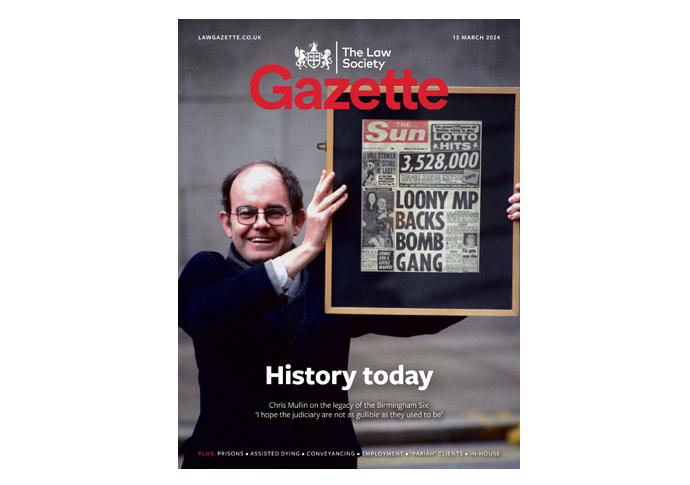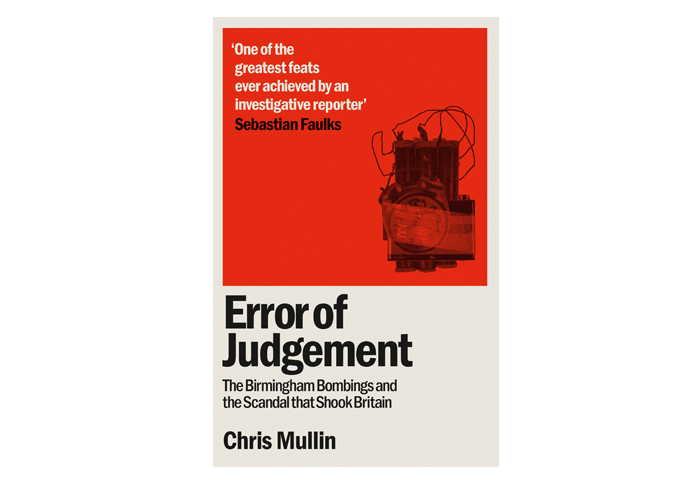Beating the odds
Tom Foot on how journalist Chris Mullin’s remarkable achievement in overturning the wrongful conviction of the Birmingham Six transformed the justice system
Thursday, 14th November 2024 — By Tom Foot

Chris Mullin holding a framed copy of The Sun’s front page on the cover of The Law Society Gazette
THE sensational release of the “Birmingham Six”, freed in 1991 after 16 years in jail for IRA bombings they did not commit, left a lasting legacy on the criminal justice system that – though still undoubtedly in need of reform – has been transformed for the better.
It was also a vindication for a long campaign by Chris Mullin who, as a journalist and Labour politician, not only overturned the men’s convictions for the pub bombings – 50 years ago this week – but tracked down the real perpetrators.
Castigated as a terrorist sympathiser, “subversive mole” and “most odious man in the Commons”, he recalled this week joyfully holding up a framed copy of The Sun’s “Loony MP Backs Bomb Gang” front page to the world’s media assembled for their release outside the Old Bailey.
Ahead of a talk at City University, Angel, he says: “For me personally, it was a very big moment. I knew that we had won and I was determined to be seen there in the street. I was anxious to be photographed. I wished to be vindicated because I had taken a great deal of abuse. That photo was printed all over the world – even The Sun published that one.”
Mullin is described as having achieved “one of the greatest feats achieved by an investigative reporter” by novelist Sebastian Faulks in a blurb on his book, Error of Judgment, first published in 1986. It has been updated for this anniversary year – naming for the first time three of the four actual bombers.
The case triggered various government-backed probes that led to key changes to the criminal justice system, and the birth of what is now the Criminal Cases Review Commission.
“It was not just getting those six poor sods released,” says Mullin. “The CCRC got off to a good start – something like 500 convictions have been quashed as a result of it examining cases – although it has in later years deteriorated…
“The West Midlands Serious Crimes Squad was disbanded, even before the six were released. And 60 of their convictions were quashed.
“No justice system in the world is infallible. But since that time: firstly, the forensic evidence has improved; DNA, for example, wasn’t around in the 1970s; CCTV makes a difference. The one area where there are still problems is with disclosure.”
Disclosure is a rule of law that requires all parties see all the evidence that is relevant to a case.
“There is the habit that the police and the prosecution lawyers have in losing evidence that is convenient to their case,” said Mullin. “Witness statements. Alibis in some circumstances.
“Look at the miscarriage case of Andrew Malkinson [recently released after 17 years wrongfully imprisoned for rape]. “That involved disclosure. The Post Office scandal too.
“The trouble is it relies on the honesty of the prosecutors and the lawyers, the authorities. This is still a real problem, though I have no doubt this has improved.
“The quality of judges has improved too. For so long, appeal court judges were a very small club of elite lawyers, who never really met with people that disagreed with them. They had, absolutely, closed minds and came from narrow backgrounds and public schools. They were selected by a mysterious process – in the Lord Chancellor’s office – called ‘soundings’. Which basically meant, ‘he’s a good chap, I’ve known him since Oxford, he’s in’.
“Nowadays, there is a Commission for appointments to which those who want to become judges have to apply. There are now women judges. People from ethnic minorities. It is a widened pool.
“Crucially, judges are less gullible when it comes to police evidence.”
Police officers relentlessly beat, starved, set hungry dogs upon, conducted a mock execution and fabricated evidence to secure convictions of Hugh Callaghan, Patrick Joseph Hill, Gerard Hunter, Richard McIlkenny, William Power and John Walker – the group that would later become known as the Birmingham Six.
Mullin said there had been a shift in the culture and process of policing in the wake of the scandal, recalling: “If anything like this was to happen now it would be to the Muslims, not the Irish. I’ve heard recently about four Muslim men in prison who have been framed, although I don’t know enough about it. But if they were, it would have to have been done in a different way.”
Police now have to ensure interviews are recorded and there are clear rules about how suspects are treated in custody.
Mullin was first tipped off about potential flaws in the case from a journalist friend who had covered the original trials, and the appeal hearings for the Guildford Four.
He says: “My interest was aroused. But I was an impoverished freelance journalist. After a long time I managed to persuade World in Action to take me on, temporarily – that was when we began to make progress.

“Then we made three docs for Granada Television. The first destroyed the forensic evidence. The second blew a hole in, but didn’t demolish, the police evidence. The third was an interview with one of the actual bombers, who was heavily disguised.
“One certainly had an impact, I was played by John Hurt. I felt a bit detached from that, Hurt had more hair than me.”
The West Midlands police later applied to the Old Bailey to force Mullin to disclose the names of the bombers he had tracked down, under the Terrorism Act.
“Fortunately the judge found in my favour – what I had done was entirely in the public interest,” says Mullin, happy to include names of three of the four bombers in the new edition as they are now dead.
The Court of Appeal, in an earlier hearing in 1988, initially upheld the convictions against the six in a devastating blow for the campaign for justice – a point when most would have given up – that led to much hand-wringing from the legal and political establishment.
In an interview at that time, the prominent judge Lord Denning had suggested some advice to journalists considering meddling with the business of the law courts: “I draw the line and I think most judges would draw the line after the decision has been given by judge and jury. The media must not go around to get what they call fresh evidence. That is undermining the system of justice altogether.”
Tell that to Chris Mullin.
• Error of Judgement – The Truth about the Birmingham Bombings – 30th anniversary. You need to register with City University to attend Chris Mullin’s talk on November 20, 6.30-8.30pm, at the Oliver Thompson Lecture Theatre, Tait Building, Northampton Square, EC1V 0HB. www.city.ac.uk/news-and-events/events/2024/november/error-of-judgement-the-truth-about-the-birmingham-bombings-30th-anniversary